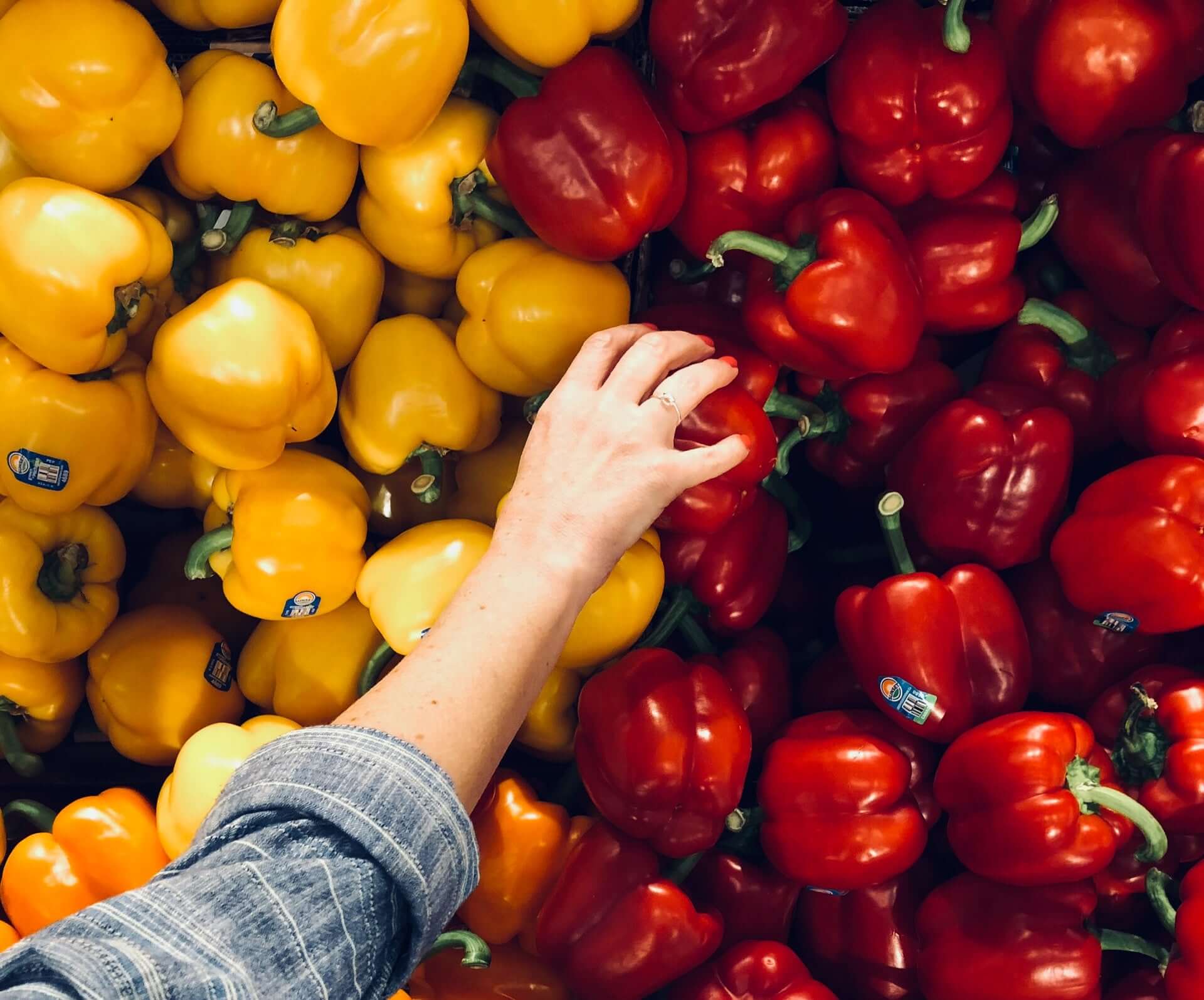
Inhaltsverzeichnis
Lebensmittel einkaufen – 7 Tipps
Lebensmittel einkaufen zu gehen, kann eine ganz schöne Tortur sein: Noch eine lästige Pflicht, die erledigt werden muss. Für andere ist der wöchentliche Einkauf oder die Suche nach den besten Angeboten schon beinahe ein Hobby. Egal wie du zum Lebensmitteleinkauf stehst – Es gibt ein paar Tipps, mit denen du dein Einkaufserlebnis noch nachhaltiger, gesünder und effizienter gestalten kannst.
7 Tipps für deinen Lebensmitteleinkauf
Die folgenden Anregungen dienen dazu, deinen Einkauf insgesamt angenehmer zu machen. Du musst diese Tipps natürlich nicht alle umsetzen; suche dir einfach das aus, was mit dir resoniert und für dich umsetzbar ist. Du kannst die Empfehlungen selbstverständlich auch abwandeln und sie für dich passend machen.
Wenn du noch weitere Tipps und Tricks hast, mit denen sich das Einkaufen schöner gestalten lässt, dann gerne her damit! 😌
1. Schreibe eine Einkaufsliste
Fangen wir mit dem offensichtlichen und banalem an: Die Einkaufsliste. Wer kennt es nicht – Zuhause denkt man sich noch: “Ach, ich brauche doch nur 5 Teile; an die erinnere ich mich auch so.” Dann steht man plötzlich im Laden und hat ein komplettes Blackout. Erst auf dem Parkplatz beim Verstauen der Lebensmittel erinnert man sich dann an das, wofür man eigentlich kam – nervig.
Durch das Schreiben einer Liste im Voraus bist du organisiert und vorbereitet. Dein gesamter Einkauf wird dadurch effizienter. Du neigst außerdem weniger zu Impulskäufen und orientierst dich viel mehr an dem, was du wirklich brauchst.
Häufig fällt uns während des Kochens oder Essens auf, welche Lebensmittel knapp werden oder neu angeschafft werden müssen. Daher ist es sinnvoll, in der Küche eine Möglichkeit zu schaffen, diese Dinge sofort zu notieren. Zum Beispiel kannst du dir einen kleinen Zettelstapel anschaffen oder eine Liste samt Stift an der Wand befestigen. Letztere Option ist super, weil dann auch andere im Haushalt lebende Personen mal schnell etwas notieren können.
Es gibt mittlerweile auch einige tolle Apps, in denen sich Einkaufslisten erstellen lassen, und die auch mit anderen Menschen geteilt werden können. Wenn es häufiger vorkommt, dass du deine Zettel zwar geschrieben hast, sie dann aber zuhause vergisst, dann ist dies bestimmt eine gute Option für dich. Schließlich ist die Wahrscheinlichkeit, das Handy zuhause liegen zu lassen, geringer. 😋
2. Reduziere Lebensmittelabfälle
Die größte Hilfe dabei, weniger Lebensmittelabfälle entstehen zu lassen: Vor dem Einkauf checken, was man noch so zuhause hat. Das ist manchmal schwierig umzusetzen, zum Beispiel, wenn man auf dem Heimweg von der Arbeit noch schnell einkaufen geht.
Dennoch sollte unser Ziel sein, möglichst nur das zu kaufen, was wir auch wirklich verbrauchen können. Denn leider werden in deutschen Haushalten immer noch viel zu viele Lebensmittel weggeschmissen. Und das schadet unserer Umwelt.
Obst und Gemüse wird schneller schlecht und landet daher besonders häufig im Müll. Ein strategisches Einkaufen kann dem vorbeugen: Wenn du weißt, dass du die Avocado vermutlich erst am Wochenende verzehrst, dann greife doch gerne zu einem noch nicht ausgereiften Exemplar. Dasselbe gilt für Bananen, Birnen, und alles andere, was zuhause noch gut nachreifen kann.
Manchmal geht es auch einfach darum, ein bisschen Obst und Gemüse zuhause zu haben, weil man noch nicht genau weiß, wann man was essen möchte. Hier lohnt es sich, zu Sorten zu greifen, die sich natürlicherweise länger halten bzw. unanspruchsvoll in der Lagerung sind. Dazu gehören zum Beispiel Kartoffeln, Tomaten, Karotten und Äpfel.
Kommt es doch mal dazu, dass wir Obst oder Gemüse gekauft haben, welches wir voraussichtlich nicht rechtzeitig verbrauchen können, dann sind Suppen, Smoothies oder Saucen eine super Möglichkeit, auch größere Mengen dieser Ware rechtzeitig zu verarbeiten und zu genießen. Denke auch daran, dass sich diese Suppen und Saucen dann auch einfrieren lassen! So müssen keine Lebensmittel weggeschmissen werden – auch, wenn du gerade im Moment keine Verwendung dafür hast.
3. Mache dir die Architektur des Supermarkts zu Nutze
Im Supermarkt jeden Gang abzugrasen, kann ewig dauern. Und auch, wenn man sich bereits auskennt und weiß, wo was zu finden ist, schaut man meist doch noch links und rechts.
Wer seinen Einkauf effizienter, gesünder und oftmals auch günstiger gestalten möchte, kann die Aufteilung der Supermärkte trotzdem zum eigenen Vorteil nutzen.
In den meisten Lebensmittelgeschäften findet man die Gemüseabteilung sowie Kühlregale meist in den äußeren Bereichen. Daher ist es sinnvoll, sich zunächst hier aufzuhalten. Frische Waren wie Obst und Gemüse, Milchalternativen und andere pflanzliche Produkte landen also zuerst im Einkaufswagen.
In den mittleren Gängen befinden sich zumeist verarbeitete Lebensmittel, Dosen, Süßwaren und verpackte Ware. Natürlich gibt es auch Ausnahmen, z.B. Gemüsekonserven.
Ich persönlich finde es immer total befriedigend, am Ende viele unverpackte, frische und gesunde Waren aufs Band legen zu können. Das gibt mir ein gutes Gefühl bezüglich meines Einkaufs. Aus diesem Grund habe ich mir angewöhnt, mich zunächst den äußeren Regalen und Bereichen des Supermarktes zu widmen und dann “ins Innere” vorzudringen, falls nötig.

Photo by Rob Maxwell on Unsplash
4. Halte nach Angeboten und reduzieren Waren Ausschau
Zugegeben – ich bin keiner der Menschen, die sich vor ihrem Einkauf genauestens darüber informieren, welcher Supermarkt gerade welche Produkte im Angebot hat. Dafür bin ich nicht vorausschauend genug (– Ganz zu schweigen davon, dass mir dazu die entsprechenden Aktionsprospekte fehlen würden…).
Worauf ich aber gerne achte, sind Beschilderungen zu Angeboten im Supermarkt selbst. Ganz besonders gern mag ich Ecken in Gemüseabteilungen, in denen “überreife” Waren reduziert angeboten werden.
Es werden immer noch viel zu viele “unschöne” oder vermeintlich überreife Exemplare von Gemüse und Obst weggeschmissen. Mittlerweile bieten einige Supermärkte diese jedoch für einen geringeren Preis an. Danach solltest du unbedingt bei deinem nächsten Einkauf Ausschau halten! Auch gekühlte Ware, die nicht mehr lang haltbar ist, wird häufig reduziert verkauft. Du solltest dich natürlich nur an Waren dieser Art bedienen, wenn du auch zeitnah Verwendung dafür findest.
Reifes Obst ist besonders süß. Aus diesem Grund wird in einigen Rezepten sogar explizit nach sehr reifen Obst-Exemplaren verlangt, wie z.B. die Bananen, die man für Bananenbrot braucht.
5. Bediene dich an gefrorenen Lebensmitteln und Konserven
Vielleicht bist mit der Ansicht aufgewachsen, dass frische Lebensmittel unverzichtbar sind und gefrorene oder abgefüllte Alternativen nicht ansatzweise so nährstoffreich sind wie ihre frischen Geschwister.
Und dass frische Lebensmittel wichtig sind, möchte ich gar nicht bestreiten. Heutzutage ist es jedoch so, dass insbesondere tiefgekühlte Waren (Obst- und Gemüsesorten), genauso gehaltvoll sind, wie frische Waren. Denn Lebensmittel, die anschließend tiefgekühlt werden, werden meist am Höhepunkt ihrer Reifezeit geerntet. Dadurch bleiben Nährstoffe und Geschmack erhalten.
Das bezieht sich vor allem auf abgepackte Tiefkühlware in “natürlicher” Form, also Lebensmittel ohne Zugabe von Geschmacksverstärkern, Zucker, Gewürzmischungen o.ä.
Für manche Menschen oder Haushalte ist es einfacher, einige Lebensmittel im Tiefkühler oder im Vorratsschrank zu lagern. Andere mögen es lieber, vor allem frische Waren zuhause zu haben. Egal zu welchem Typ du gehörst – es ist völlig in Ordnung!
Zudem haben tiefgekühlte oder abgefüllte Lebensmittel den Vorteil, dass sie sich deutlich länger halten und gut portionieren lassen. Das ist einfach praktisch! Vor allem, wenn man eine vollwertige Mahlzeit zubereiten möchte, aber gerade wenig Frischware zur Hand hat.
Für eine schnelle Mahlzeit eignen sich auch Konserven besonders gut. Diese halten sich ebenfalls sehr lang und können einfach zubereitet werden. Viele Menschen mit pflanzlicher Ernährung erfreuen sich protein- und eisenreicher Konserven wie Kichererbsen, Linsen oder Bohnen. Wer möchte, kann beim Kauf von Konserven darauf achten, dass möglichst wenig Salz hinzugegeben wurde.
6. Saisonal und regional einkaufen
Saisonale Produkte haben viele Vorteile. Zum einen sind sie oftmals günstiger, was bedeutet, dass wir mehr für weniger Geld bekommen. Zum anderen sind saisonale Produkte frischer und geschmackvoller, eben weil sie ausgereift geerntet werden können.
Orientieren wir uns an der Saisonalität von frischen Lebensmitteln, tendieren wir außerdem dazu, uns abwechslungsreicher zu ernähren. So entdecken wir auf spielerische Art und Weise neue Sorten, Gerichte und Geschmäcker!
Saisonales und regionales Einkaufen hat aber nicht nur Vorteile für uns als Verbraucher:innen, sondern auch Vorteile für die Umwelt. Produkte, die aus der Umgebung stammen und gerade Saison haben, müssen viel kürzere Lieferwege zurücklegen. Dadurch kann einiges an schädlichen Umweltgasen eingespart werden.
Wochenmärkte sind hier unbedingt zu empfehlen. Die Lebensmittel, die dort verkauft werden, stammen so gut wie immer aus der Region. Auf dem Markt erworbene Ware ist nicht nur deutlich günstiger, als im Supermarkt (Vor allem, wenn man große Mengen benötigt). Hinzu kommt, dass du damit kleinere, lokale Unternehmen unterstützen kannst, was eine super Sache ist.
7. Den eigenen Plastikverbrauch reduzieren
Es ist an der Zeit ist, unsere Beziehung mit Plastik zu beenden. Schritt für Schritt. Für die Umwelt. In einem anderen Artikel habe ich bereits ausführlicher darüber gesprochen, wie du deinen Plastikverbrauch reduzieren kannst. Daher hier nur in Kürze:
Das Verwenden von wiederverwendbaren Einkaufstüten wird glücklicherweise immer mehr zur Normalität. Taschen aus recyceltem Material oder Stoff sind zudem meist größer und halten deutlich länger, als einfache Papier- oder Plastiktüten. Gleichzeitig sparst du dir mit jedem Mal, bei dem du deine eigenen Taschen mitbringst, ein bisschen Geld.
Auch für die kleinen, durchsichtigen Plastiktütchen für Gemüse oder Obst gibt es mittlerweile wiederverwendbare Alternativen. Das gleiche gilt übrigens für die Tüten beim Bäcker! Ich bin noch keiner Bäckerei-Verkaufskraft begegnet, die sich nicht darüber gefreut hat, meine Backwaren in mein eigens mitgebrachtes Brotsäckchen zu packen. 😊
Wenn du noch mehr über gesunde Ernährung, Achtsamkeit, Nachhaltigkeit oder Familie und Schwangerschaft erfahren möchtest, schaue dir hier noch mehr spannende Blog-Artikel zu diesen Themen an.

Photo by The Creative Exchange on Unsplash



























Leave a comment
This site is protected by hCaptcha and the hCaptcha Privacy Policy and Terms of Service apply.